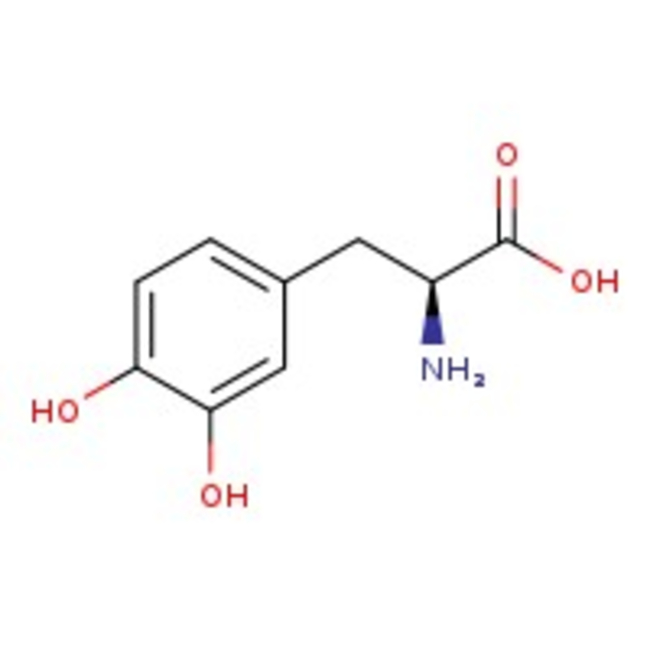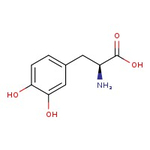Search Thermo Fisher Scientific
Thermo Scientific Chemicals
3,4-Dihydroxy-L-phenylalanine, 98+%
3-(3,4-Dihydroxyphenyl)-L-alanine (levodopa orL-dopa), CAS # 59-92-7, is a dopamine precursor molecule.
Catalog number ALFA11311.14
View Price:Sign InSign in to see your account pricing. Need an account? Register with us today.
Quantity:
25 g
Specifications
Chemical Name or Material3,4-Dihydroxy-L-phenylalanine
Melting Point∼295°C (decomposition)
CAS59-92-7
Health Hazard 1H302-H315-H319
Health Hazard 2GHS H Statement
H301
Toxic if swallowed.
H301
Toxic if swallowed.
View more
3,4-dihydroxy-L-phenylalanine (DOPA) is used as a cell adhesion molecule in serum-free cultures of anchorage-dependent mammalian cells. It is also used as an anticholinergic drug and used in the treatment of Parkinson's disease. It acts as an intermediate in the biosynthesis of other catecholamines (norepinephrine, epinephrine) and melanin. It acts as a precursor of dopamine product of tyrosine hydroxylase.
This Thermo Scientific Chemicals brand product was originally part of the Alfa Aesar product portfolio. Some documentation and label information may refer to the legacy brand. The original Alfa Aesar product / item code or SKU reference has not changed as a part of the brand transition to Thermo Scientific Chemicals.
General Description
- 3-(3,4-Dihydroxyphenyl)-L-alanine, or L-dopa, is converted to dopamine by DOPA decarboxylase in the body
- Upon conversion to dopamine, it acts as an excitatory neurotransmitter
Applications
- L-dopa is useful in the laboratory study of Parkinson's to replenish dopamine in depleted circuits
- L-dopa has also been used for laboratory research on hypertension and melanocyte activity
RUO – Research Use Only
General References:
- Maini Rekdal, V.; Bess, E.N.; Bisanz, J.E.; Turnbaugh, P.J.; Balskus EP. Discovery and inhibition of an interspecies gut bacterial pathway for Levodopa metabolism. Science. 2019, 364(6445), eaau6323.
- Hong, C.T.; Chan, L.; Bai, C.H. The Effect of Caffeine on the Risk and Progression of Parkinson's Disease: A Meta-Analysis. Nutrients. 2020, 12(6), 1860.



